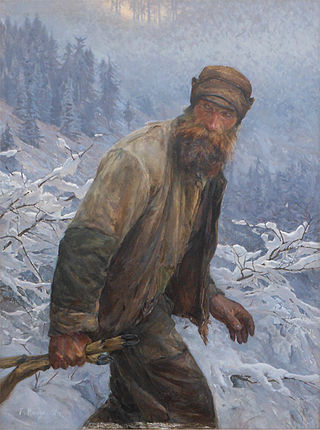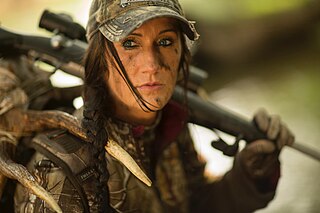Olivia Opre | |
|---|---|
| Born | Olivia Nalos 1977 (age 46–47) |
| Occupation | Hunter |
| Known for | Sport Hunting |
| Spouse | Tom Opre |
| Children | 4 |
Olivia Nalos Opre is a conservation enthusiast and 2003 Mrs. Nebraska [1] and Mrs. America contestant who lives in Montana.
Olivia Opre | |
|---|---|
| Born | Olivia Nalos 1977 (age 46–47) |
| Occupation | Hunter |
| Known for | Sport Hunting |
| Spouse | Tom Opre |
| Children | 4 |
Olivia Nalos Opre is a conservation enthusiast and 2003 Mrs. Nebraska [1] and Mrs. America contestant who lives in Montana.
Opre developed a love for hunting at 16 years old. She was a Mrs. Nebraska winner in 2003. [1] [2]
Opre is a former Miss Nebraska who competed for the Miss America title. Her controversial career involves trophy hunting. She claims to have hunted on six continents: 100 different species of animals. [3] She has received death threats for her defense of trophy hunting and animal rights advocates have started a petition against her. [4] She has often appeared in news media as an ambassador for trophy hunting. She and her husband host a show on NBC Sports outdoor called, Eye of The Hunter, she also is assists Jack Brittingham's World of Hunting Adventure . In 2015 she wrote an article for USA Today in defense of hunting entitled, "Why we hunt, even lions". [5] [6]
In 2020 Opre hunted a rare Alpine ibex in Valais Switzerland. The hunt of the Ibex sparked a protest and another petition which accumulated 75,000 signatures. The Swiss defended the hunt saying the hunt was designed to cull the herd of older males, and the fee of $20,000 is used to subsidize local hunting permits. [7]
Opre is often mentioned when there is criticism of trophy hunters, especially women hunters. [8]
In 2018 she was appointed to the Trump administration's conservation council. [3] At that time the Associated Press reported that Opre killed a hippo, a buffalo, a black rhino and a lion, all in Africa. Opre corrected the AP to say she had not killed rhino, but used a tranquilizer dart on the animal. [9] Her appointment to the council was widely panned. The council only had one scientific expert; a veterinarian (zoo medicine) Jenifer Chatfield. [10]

Hunting is the human practice of seeking, pursuing, capturing, or killing wildlife or feral animals. The most common reasons for humans to hunt are to exploit the animal's body for meat and useful animal products, for recreation/taxidermy, although it may also be done for non-exploitative reasons such as removing predators dangerous to humans or domestic animals, to eliminate pests and nuisance animals that damage crops/livestock/poultry or spread diseases, for trade/tourism, or for ecological conservation against overpopulation and invasive species.

Poaching is the illegal hunting or capturing of wild animals, usually associated with land use rights. Poaching was once performed by impoverished peasants for subsistence purposes and to supplement meager diets. It was set against the hunting privileges of nobility and territorial rulers.

In Africa, the Big five game animals are the lion, leopard, rhinoceros, elephant, and African buffalo. The term was coined by big-game hunters to refer to the five most difficult animals in Africa to hunt on foot, but is now more widely used by game viewing tourists and safari tour operators. They are examples of charismatic megafauna, featuring prominently in popular culture, and are among the most famous of Africa's large animals.

A game reserve is a large area of land where wild animals are hunted in a controlled way for sport. If hunting is prohibited, a game reserve may be considered a nature reserve; however, the focus of a game reserve is specifically the animals (fauna), whereas a nature reserve is also, if not equally, concerned with all aspects of native biota of the area.

The International Council for Game and Wildlife Conservation (CIC) (French: Conseil International de la Chasse et de la Conservation du Gibier, German: Internationaler Rat zur Erhaltung des Wildes und der Jagd) is a politically independent not-for-profit international organisation, aiming to preserve wildlife through the promotion of sustainable use of wildlife resources. The initialism "CIC" comes from the organisation's original French name Conseil International de la Chasse.
A canned hunt is a trophy hunt which is not "fair chase", typically by having game animals kept in a confined area such as in a fenced ranch to prevent the animals' escape and make tracking easier for the hunter, in order to increase the likelihood of the hunter obtaining a kill. The term has been used for driven grouse shooting, in which large areas of Britain are farmed for red grouse. According to WordNet, a canned hunt is a "hunt for animals that have been raised on game ranches until they are mature enough to be killed for trophy collections."
The Born Free Foundation is an international wildlife charity that campaigns to "Keep Wildlife in the Wild". It protects wild animals in their natural habitat, campaigns against the keeping of wild animals in captivity and rescues wild animals in need. It also promotes compassionate conservation, which takes into account the welfare of individual animals in conservation initiatives. Born Free also creates and provides educational materials and activities that reflect the charity's values.

Trophy hunting is a form of hunting for sport in which parts of the hunted wild animals are kept and displayed as trophies. The animal being targeted, known as the "game", is typically a mature male specimen from a popular species of collectable interests, usually of large sizes, holding impressive horns, antlers, furs or manes. Most trophies consist of only select parts of the animal, which are prepared for display by a taxidermist. The parts most commonly kept vary by species, but often include head, hide, tusks, horns, or antlers.

Safari Club International (SCI) is a US organization composed of hunters dedicated to protecting the “freedom to hunt.” SCI has more than 40,000 members and 180 local chapters. SCI members agree to abide by the organization's code of ethics, which includes making a positive contribution to wildlife and ecosystems, complying with game laws, and assisting game and fish officers.

Big-game hunting is the hunting of large game animals for trophies, taxidermy, meat, and commercially valuable animal by-products. The term is often associated with the hunting of Africa's "Big Five" games, and Indian rhinoceros and Bengal tigers on the Indian subcontinent.
Afghanistan has long been known for diverse wildlife. Many of the larger mammals in the country are categorized by the International Union for Conservation of Nature as globally threatened. These include the snow leopard, Marco Polo sheep, Siberian musk deer, markhor, urial, and the Asiatic black bear. Other species of interest are the ibex, the gray wolf, and the brown bear, striped hyenas, and numerous bird of prey species. Most of the Marco Polo sheep and ibex are being poached for food, whereas wolves, snow leopards and bears are being killed for damage prevention.

A professional hunter is a person who hunts and/or manages game by profession. Some professional hunters work in the private sector or for government agencies and manage species that are considered overabundant, others are self-employed and make a living by selling hides and meat, while still others guide clients on big-game hunts.

Bomo Edith Edna Molewa, formerly known as Edna Sethema, was a South African politician and member of the African National Congress. Molewa became the Minister of Water and Environmental Affairs of South Africa on 31 October 2010, as part of a cabinet reshuffle by President Jacob Zuma. On 25 May 2014 her Ministry has been divided and she was appointed Minister of Environmental Affairs. She succeeded Buyelwa Sonjica. Prior to her death, Molewa was studying towards a Bachelor's of Arts Honours in Developmental Studies through the University of South Africa.

The SanWild Wildlife Sanctuary is a 5,000 ha (50 km2) wildlife rehabilitation center and reserve in South Africa's Limpopo Province, located a few kilometers south of Leydsdorp, and near the western boundary of the Kruger National Park.

Cecil was a male African lion who lived primarily in the Hwange National Park in Matabeleland North, Zimbabwe. He was being studied and tracked by a research team of the University of Oxford as part of a long-term study.

Melissa Bachman is an American hunter, producer, and host of hunting television programs, currently of the cable television program Winchester Deadly Passion on the Sportsman Channel, Pursuit Channel, and Wild TV. As a prominent female hunter, she has received personal online attacks.

Green hunting is the practice of tracking and shooting game animals with non-lethal tranquilizer guns or bows and subsequently releasing the captured animals alive. Green hunting would typically be performed when tranquilization of the animal is necessary for veterinary, monitoring or species translocation purposes.
Thomas D. Mangelsen is an American nature and wildlife photographer and conservationist. He is most famous for his photography of wildlife in the Greater Yellowstone Ecosystem, as he has lived inside the zone in Jackson, Wyoming, for over 40 years. In 2015, he and nature author Todd Wilkinson created a book, The Grizzlies of Pilgrim Creek, featuring a grizzly bear known as Grizzly 399, named so due to her research number. He has been active in the movement to keep the Yellowstone area grizzly bears on the Endangered Species List. Mangelsen is also known for trekking to all seven continents to photograph a diverse assortment of nature and wildlife. A photograph he took in 1988 titled, "Catch of the Day" has been labeled "the most famous wildlife photograph in the world". In May 2018, he was profiled on CBS 60 Minutes. He has received dozens of accolades throughout the decades.
Count Zsigmond Széchenyi of Sárvár-Felsővidék was a Hungarian hunter, traveler and writer. An outstanding figure of the Hungarian hunting culture. He hunted in Africa, India, Alaska and various parts of Europe. His outstanding hunting trophy is a world record addax. His hunting library is the collection of the most significant hunting textbook in Hungary, which can currently be viewed in the Hungarian Museum of Natural History.
Trophy Hunting in Pakistan is a form of hunting for sport in which parts of the hunted wild animals are kept and displayed as trophies. Pakistan harbors a collection of the most uncommon types of wild sheep and goats on the planet. These include the Blue Sheep, Kashmir, Astor, and Suleman Markhors, as well as Punjab, Blandford, and Afghan Urials, alongside the Himalayan and Sindh Ibex.